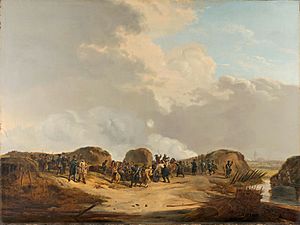Siege of Naarden (1813–1814) facts for kids
Quick facts for kids Siege of Naarden |
|||||||
|---|---|---|---|---|---|---|---|
| Part of War of the Sixth Coalition | |||||||
 The arrival of soldiers and guns of the National Guard of Amsterdam at the entrenchments outside Naarden. |
|||||||
|
|||||||
| Belligerents | |||||||
| Commanders and leaders | |||||||
The Siege of Naarden was a long fight for the city of Naarden in the Netherlands. From November 1813 to May 1814, Dutch and Russian armies surrounded the city. They were trying to free the Netherlands from French control. This event was part of a bigger conflict called the War of the Sixth Coalition. The French commander in Naarden didn't believe that Napoleon had been captured. Because of this, the siege lasted for many months. In the end, the French soldiers were allowed to leave with respect.
How Did the Siege of Naarden Begin?
In October 1813, a major battle happened in Leipzig, Germany. Napoleon, the French emperor, was defeated there. After this big loss, several powerful countries decided it was time to free the Netherlands. The Netherlands had been under French rule for nearly 20 years.
The Dutch king, Willem I, had been living in England. He returned to Holland in November 1813. He received help from armies from Prussia and Russia. These armies joined forces to push the French out of the country.
What Happened During the Battle?
Russian soldiers, known as Cossacks, were the first to reach Naarden. The French soldiers quickly went inside the city's strong fortress. They hoped Napoleon would return and save them. This situation happened in other Dutch cities too, like Den Helder and Gorinchem.
However, the French forces in Naarden were very strong. They refused to give up. Some Dutch soldiers even fought on the French side. They had joined Napoleon's army, called the Grande Armée. During the siege, most of Naarden was badly damaged. Bombs and cannons destroyed many buildings.
Even with all the destruction, very few people were hurt. Both the French soldiers and the people living in Naarden were able to hide. They stayed safe within the thick walls of the fortress.
When the allied armies heard that Napoleon had been captured, they told the French in Naarden. But the French soldiers didn't believe them. They kept fighting. Finally, after many tries, a special message arrived from the French government. This message convinced the French in Naarden that Napoleon was truly captured. In May 1814, the French soldiers were allowed to leave Naarden with their honor.
What Happened After the Siege?
The Siege of Naarden wasn't the most important battle in the war. But it was very important for Willem I. He needed to show that the new Dutch country could stand on its own. At this time, big countries were redrawing the maps of Europe. This was happening at a meeting called the Congress of Vienna.
In the end, the Kingdom of the Netherlands was allowed to exist. Some people thought it should become part of the British Empire or Prussian lands. Instead, it became a "buffer state." This meant it was a small country between bigger, powerful nations. Its job was to help keep peace in the region.
However, the peace didn't last long. Napoleon escaped from his prison on the island of Elba. He returned to France. This led to another famous battle, the Battle of Waterloo, in June 1815.
 | Emma Amos |
 | Edward Mitchell Bannister |
 | Larry D. Alexander |
 | Ernie Barnes |

